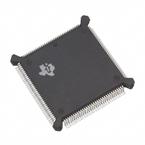description
●The TMS320C240 and TMS320F240 devices are the first members of a new family of DSP controllers based on the TMS320C2xx generation of 16-bit fixed-point digital signal processors (DSPs). Unless otherwise noted, the term ’x240 refers to both the TMS320C240 and the TMS320F240. Table 1 provides a comparison of the features of each device.
● High-Performance Static CMOS Technology
● Includes the T320C2xLP Core CPU
● – Object Compatible With the TMS320C2xx
● – Source Code Compatible With TMS320C25
● – Upwardly Compatible With TMS320C5x
● – 132-Pin Plastic Quad Flat Package (PQ Suffix)
● – 50-ns Instruction Cycle Time
● Industrial and Automotive Temperature Available
● Memory
● – 544 Words × 16 Bits of On-Chip Data/Program Dual-Access RAM
● – 16K Words × 16 Bits of On-Chip Program ROM (’C240)/Flash EEPROM (’F240)
● – 224K Words × 16 Bits of Total Memory Address Reach (64K Data, 64K Program and 64K I/O, and 32K Global Memory Space)
● Event-Manager Module
● – 12 Compare/Pulse-Width Modulation (PWM) Channels
● – Three 16-Bit General-Purpose Timers With Six Modes, Including Continuous Upand Up/Down Counting
● – Three 16-Bit Full-Compare Units With Deadband
● – Three 16-Bit Simple-Compare Units
● – Four Capture Units (Two With Quadrature Encoder-Pulse Interface Capability)
● Dual 10-Bit Analog-to-Digital Conversion Module
● 28 Individually Programmable, Multiplexed I/O Pins
● Phase-Locked-Loop (PLL)-Based Clock Module
● Watchdog Timer Module (With Real-Time Interrupt)
● Serial Communications Interface (SCI) Module
● Serial Peripheral Interface (SPI) Module
● Six External Interrupts (Power Drive Protect, Reset, NMI, and Three Maskable Interrupts)
● Four Power-Down Modes for Low-Power Operation
● Scan-Based Emulation
● Development Tools Available:
● – Texas Instruments (TI) ANSI C Compiler, Assembler/Linker, and C-Source Debugger
● – Scan-Based Self-Emulation (XDS510)
● – Third-Party Digital Motor Control and Fuzzy-Logic Development Support


